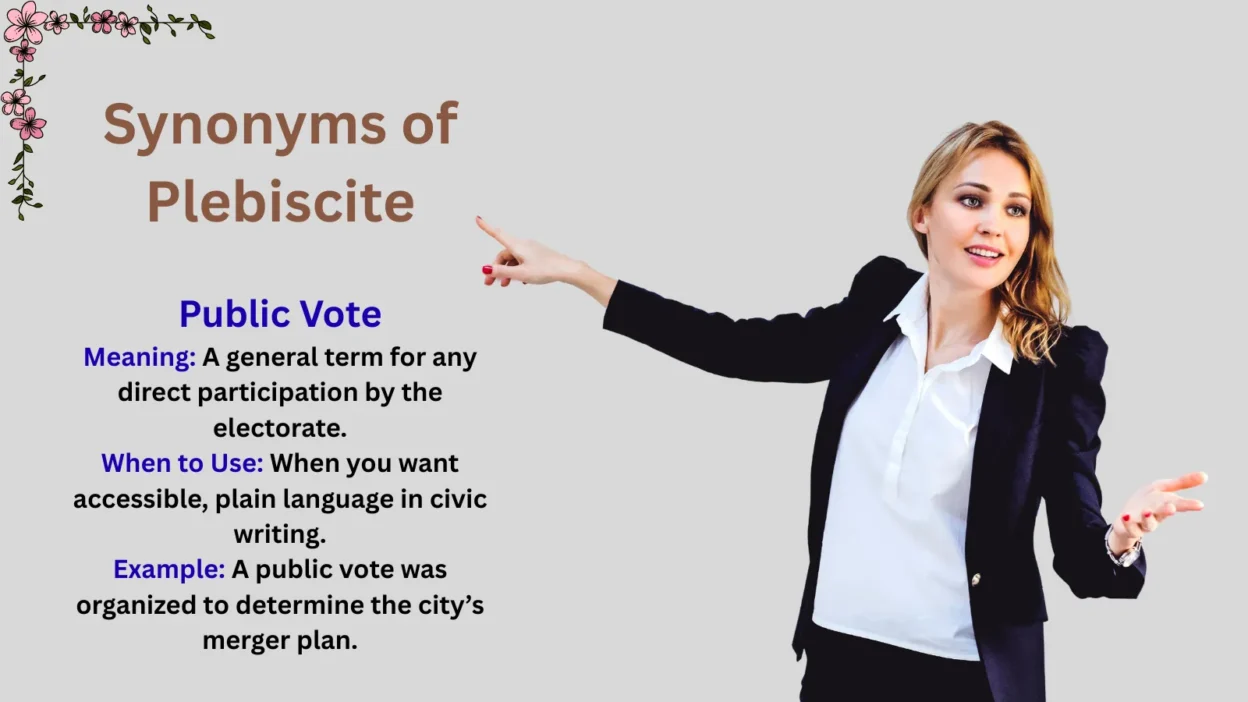Synonyms of plebiscite, such as referendum, vote, ballot, and poll, describe a process where citizens express their opinion directly on a specific issue. For example, a “referendum” often involves deciding on a law or policy, while a “ballot” highlights the act of voting itself. These words capture different shades of democratic participation and decision-making.
If you’re writing about politics, governance, or civic rights, using the right synonym for plebiscite helps you express ideas about public choice and collective will more clearly.
These synonyms of plebiscite not only enrich your vocabulary but also highlight the importance of people’s voices in shaping policies, leadership, and national identity. From historical decisions to modern elections, the language of plebiscites reflects the power of democracy in action.
What Does Plebiscite Mean?
A plebiscite is a direct vote by the people on a specific issue or proposal, often used to decide major political or constitutional questions. It typically involves:
- A nationwide or regional vote on one clear question
- Expression of public opinion on laws or leadership
- A democratic method for decision-making
- The people’s direct participation in governance
It’s not just an election—it’s a focused act of collective choice. Think of a plebiscite as a moment when citizens directly shape the path of their country or community.
Synonyms for Plebiscite (With Meanings, Usage, and Examples)
1. Referendum
Meaning: A general vote by the electorate on a specific proposal, often a change in the constitution.
When to Use: The most common synonym; use it in legal or political discussions.
Example: The country held a referendum to decide on joining the trade bloc.
2. Vote
Meaning: The act of expressing a choice or opinion, typically in elections.
When to Use: Use for broader, everyday contexts where formal structure isn’t emphasized.
Example: Citizens cast their vote for the new environmental law.
3. Ballot
Meaning: A method of secret voting or the paper used to cast a vote.
When to Use: Ideal for emphasizing the process rather than the event.
Example: Each voter placed a ballot in the box to support the reform.
4. Poll
Meaning: The process of voting or the counting of votes.
When to Use: Common in journalistic and informal political contexts.
Example: Exit polls predicted a strong majority for the independence campaign.
5. Election
Meaning: A formal process of selecting representatives or deciding on issues.
When to Use: Broader than “plebiscite”; best for political offices rather than policy questions.
Example: A special election was held to approve the new local charter.
6. Mandate
Meaning: An official order or commission given by voters to a representative government.
When to Use: Use when emphasizing public support or legitimacy.
Example: The leader viewed the plebiscite’s result as a clear mandate to proceed.
7. Public Vote
Meaning: A general term for any direct participation by the electorate.
When to Use: When you want accessible, plain language in civic writing.
Example: A public vote was organized to determine the city’s merger plan.
8. National Vote
Meaning: A countrywide vote involving the entire electorate.
When to Use: To highlight the scope and scale of a plebiscite.
Example: A national vote was called to approve the new constitution.
9. Popular Vote
Meaning: The total number of votes cast by the electorate.
When to Use: Best for discussions on democratic representation.
Example: The amendment was passed through a decisive popular vote.
10. People’s Vote
Meaning: A vote that reflects the collective will of the public.
When to Use: Often used in activist or populist language.
Example: The opposition called for a people’s vote on the trade agreement.
11. Civic Poll
Meaning: A public poll conducted to gauge citizens’ opinions or decisions.
When to Use: Use when emphasizing community-level engagement.
Example: A civic poll revealed growing support for decentralization.
12. Constitutional Referendum
Meaning: A vote specifically concerning constitutional change.
When to Use: Use in formal, legal, or governmental contexts.
Example: The constitutional referendum determined the new governance structure.
13. Public Consultation
Meaning: The process of seeking the public’s views before making a decision.
When to Use: When the outcome isn’t binding but still influential.
Example: The council initiated a public consultation before scheduling a plebiscite.
14. Democratic Decision
Meaning: A choice made through democratic processes.
When to Use: When emphasizing fairness and collective voice.
Example: The democratic decision to separate was respected by all parties.
15. General Vote
Meaning: A vote open to all eligible citizens.
When to Use: When stressing inclusivity rather than the issue itself.
Example: The general vote confirmed the citizens’ trust in their new leadership.
16. Direct Democracy
Meaning: A form of democracy in which citizens vote directly on laws and policies.
When to Use: To describe the political philosophy behind a plebiscite.
Example: Switzerland’s frequent referendums showcase direct democracy in action.
17. Public Decision
Meaning: A decision reached collectively by the public.
When to Use: Appropriate in civic or educational discussions.
Example: The public decision to rebuild the district was widely celebrated.
18. National Consultation
Meaning: The process of gauging national opinion before implementing major policies.
When to Use: Use when the government seeks input but not necessarily binding results.
Example: A national consultation preceded the independence plebiscite.
19. Public Mandate
Meaning: Authorization granted by the public to act on their behalf.
When to Use: For formal, political discussions emphasizing legitimacy.
Example: The victory in the plebiscite provided a strong public mandate.
20. Direct Vote
Meaning: A vote made directly by the people without intermediaries.
When to Use: When stressing the direct involvement of citizens.
Example: The reform was approved through a direct vote.
21. Legislative Referendum
Meaning: A vote initiated by the legislature to seek public approval.
When to Use: Use in political or governmental contexts.
Example: The parliament called a legislative referendum to confirm the new law.
22. Advisory Vote
Meaning: A non-binding vote used to gauge public opinion.
When to Use: When the result doesn’t have immediate legal power.
Example: An advisory vote showed strong public support for reform.
23. Electoral Measure
Meaning: A specific issue or proposal placed before voters.
When to Use: Common in U.S. and local government contexts.
Example: The electoral measure on taxation was approved by a narrow margin.
24. Policy Vote
Meaning: A vote on a particular government policy.
When to Use: In policy-oriented or administrative discussions.
Example: The policy vote decided the future of the healthcare plan.
25. National Ballot
Meaning: A vote involving the entire nation’s electorate.
When to Use: Emphasize the magnitude of participation.
Example: The national ballot confirmed the region’s decision to unify.
26. Voter Initiative
Meaning: A process allowing citizens to propose and vote on legislation directly.
When to Use: Best in contexts about grassroots democracy.
Example: The voter initiative on environmental reform gained massive support.
27. Popular Consultation
Meaning: A process of seeking public input on key issues.
When to Use: When emphasizing inclusivity and participation.
Example: The popular consultation revealed deep divisions over the proposal.
28. Civil Poll
Meaning: A structured vote or survey among citizens on a civil issue.
When to Use: Ideal for community or social matters.
Example: A civil poll was held to decide on the city’s redevelopment plan.
29. Sovereignty Vote
Meaning: A vote determining national or regional independence.
When to Use: Perfect for historical or geopolitical discussions.
Example: The sovereignty vote resulted in a new independent state.
30. Self-Determination Vote
Meaning: A plebiscite where people decide their political status or governance.
When to Use: Often in international law or decolonization contexts.
Example: The self-determination vote marked a milestone in the nation’s history.
How to Choose the Right Synonym
Choosing the right synonym depends on context, tone, and purpose:
| Context | Best Synonyms | Tone/Style |
| Legal or Constitutional | Referendum, Legislative Referendum, Constitutional Referendum | Formal, precise |
| Political Campaigns | People’s Vote, Mandate, Public Vote | Persuasive, emotive |
| Historical/Geopolitical | Sovereignty Vote, Self-Determination Vote | Nationalistic, formal |
| Community Decisions | Civic Poll, Public Consultation, Civil Poll | Local, participatory |
| Academic or Analytical Writing | Direct Democracy, Electoral Measure, Policy Vote | Neutral, scholarly |
Tip:
If you’re writing formally, “referendum” or “constitutional referendum” sounds precise.
If you’re writing journalistically or for public understanding, “people’s vote” or “public vote” feels more relatable.
For international or independence topics, “sovereignty vote” or “self-determination vote” carries emotional and political weight.
Conclusion:
Synonyms of plebiscite reveal how language captures the essence of public decision-making. Words like referendum, vote, and ballot each highlight a different face of democracy—one focused on choice, another on process, and another on collective agreement.
Choosing the right synonym allows you to express the balance between people’s power and political action. Whether discussing local governance or national referendums, these terms remind us that every voice carries weight.
Ultimately, a plebiscite stands as a symbol of direct democracy—a moment when citizens don’t just watch history unfold, but help write it.



